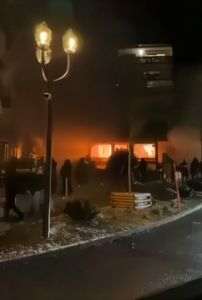The Court of Justice of the European Union claims that the Rasdaq is not a regulated market, even though stocks listed on it are traded with the help of the electronic system provided by the Bucharest Stock Exchange, according to a communiqué sent by law firm "Duţescu şi Asociaţii" ("Duţescu and Associates") yesterday.
In June, the judges of the Court of Appeal of Cluj have suspended the lawsuit by which several brokers of "BT Securities", including Rareş Nilaş, the head of the company, and the businessman of Cluj Gicu Agenor Gânscă are charged with stock market manipulation, concerning a series of trades concluded between November 2007-February 2008, on the Rasdaq market with shares of ACI SA Bistriţa (symbol: ACIS).
Rareş Nilaş, the general manager of BT Securities, gave us the following statement yesterday: "Me and my clients will be acquitted, because the market abuse which we are being charged with does not legally exist".
The lawyers of "Duţescu&Partners" have the following to say: "Aside from the legal effects generated by this interpretation of the notion of regulated market, which is a first from the Court of Justice of the EU, we want to emphasize that regardless of whether the market that Mr. Gicu Agenor Gânscă conducted his operations with the shares of ACIS on, is regulated or not, his orders and his trades, including the buying orders, did not represent market manipulation and have caused no harm to the market participants".
On May 13th 2011, the judges had asked the European Court of Justice to issue a statement on the status of the Rasdaq market, in their legal proceedings against Gicu Agenor Gânscă, Nilaş Rareş Doralin, Sergiu-Dan Dascăl, Ana-Maria Oprean, Ionuţ Horea Baboş.
Before notifying the European Court of Justice, the judges have asked for the opinion of the Romanian National Securities Commission (CNVM). The latter replied that the Rasdaq market had not been reported in Brussels as being a regulated market.
SCA "Duţescu şi Asociaţii" said that it supports the immediate clarification of the legal status of the Rasdaq market, in order to make it comply with the legal status of the MiFID Directive.
In July 2011, two courts of Cluj determined that the legal status of the Rasdaq market means that it can not be considered a regulated market, granting relief to the minority shareholders of an issuer who demanded their right to exit the company.
The restructuring of the Rasdaq has been on the agenda of the BSE for a few years. In 2007, the latter has proposed the creation of a special tier, called Rasdaq-Star, which would host the issuers listed on the Rasdaq, who met the eligibility requirements for being listed on a regulated market. However, in 2008 the CNVM rejected the proposal of the BSE.
In the beginning of last year, the CNVM had initiated a project through which the issuers of the Rasdaq were required to choose between the BSE and the alternative trading system, but this plan also stalled. In an interview granted in the beginning of this month, Gabriela Anghelache, the president of the CNVM, told us that sadly, the Rasdaq issue has been without a solution for years. According to her, issuers may not be moved to a different market without the agreement of their shareholders. The Commission has made it its goal to resume talks about the status of the Rasdaq market together with the new Council of the Bucharest Stock Exchange.
• The clarifications of the Court of Justice of the European Union
According to the lawyers of "Duţescu&Partners", in the case concerning the issuing of a preliminary ruling on the interpretation of the dispositions of the Directive of the European Parliament and of the Council of 2004/39/CE (MiFID), concerning the applicability of the notion of "regulated market", more specifically the application of the regulated market status in the case of markets which do not meet the requirements of Title III of the MiFID, the Court of Justice of the European Union has decided that article 4 paragraph (1) point 14 of the MiFID "must be construed to mean that a market with financial instruments which does not meet the requirements stipulated in Title III of that directive does not represent a < < regulated market > >, according to the definition of the aforementioned disposition, even if its operator merged with the operator of a regulated market."
The Court of Justice of the European Union emphasized that "in order to be considered a < < regulated market > >, a market for financial instruments must be authorized as a regulated market and on the other hand, an essential condition is that it must be operating in compliance with the requirements stipulated in the European directive to obtain and maintain that authorization: "Therefore, the fact that, as emphasized by the Romanian government, the shares are traded on the Rasdaq market through the electronic system provided by the Bucharest Stock Exchange S.A. is not sufficient to make this market qualify as «regulated market » from a legal standpoint, in the absence of the requirements enumerated at point 43 of the present decision. (s.n.)".
•
• The prosecution's charge
According to the charge, Gicu Agenor Gânscă was accused of manipulating the stock market, after using a preliminary sale contract to buy shares in "ACI" Bistriţa, and later made the transaction through the BSE, in order to make it appear legal.
The prosecutors claim that in 2007, the businessman of Cluj concluded pre-sale contract with the manager of "ACI" Bistriţa, Ioan Blaga, through which he would acquire two blocks of shares, of 343,092 shares, and 3.66 million shares, respectively. The trade on the stock market was conducted at the price which had been established through the preliminary sales contract, through BT Securities.
According to the prosecutors' charges, first, a broker of BT Securities placed the order to sell 3.66 million shares of ACIS, at a price of 0.1 lei/share, and one minute later, he placed the order to buy, which was filled at the ask price.
















































